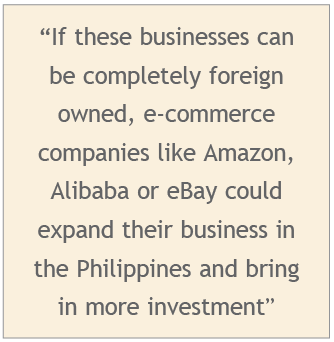 By Agustin P Geraldez, ACCRA Law
By Agustin P Geraldez, ACCRA Law
For many, this author included, what comes to mind when hearing the term internet businesses, are online selling websites. Ever since e-commerce has evolved to make products easier to discover and purchase through online retailers and marketplaces, the Philippines has cashed in on the trend with emerging websites like Lazada, Zalora and Food Panda.
The 11th Foreign Investment Negative List (FINL) was promulgated last October 29, 2018. Among the notable changes from the 10th FINL is the liberalisation on foreign ownership for internet businesses, which now allows 100 percent foreign ownership. The FINL adopted the definition found in DOJ Opinion 40 (s.1998), which says internet businesses refer to internet access providers (PLDT, Sky Broadband, etc) that merely serve as carriers for transmitting messages, rather than being the creator of messages/information. The same opinion held that internet access providers are no longer considered mass media. This is significant, as mass media is not allowed to have any foreign equity.
By way of background, prior to the 11th FINL, the 1987 Constitution under Article XVI Section 11(1) restricted foreign ownership over mass media saying that it should be 100 percent Filipino owned. Moreover, Republic Act (RA) No 7042, otherwise known as the Foreign Investments Act of 1991, and the 10th Regular Foreign Investment Negative List provide that except for recording, no foreign equity is allowed in mass media. When the 1987 Constitution was passed, the internet was not in existence and traditional mass media was limited to print and broadcasting. However, subsequent legislations and opinions of the Securities and Exchange Commission (SEC), considered the internet and mobile technology as platforms for mass media.

RA No 7934, otherwise known as The Consumer Act of the Philippines, defines “mass media” as any means or methods used to convey advertising messages to the public such as television, radio, magazines, cinema, billboards, posters, streamers, hand bills, leaflets, mails and the like. Likewise, under RA No 9211, otherwise known as the Tobacco Regulation Act of 2003, “mass media” is defined as any medium of communication designed to reach a mass of people. For this purpose, mass media includes print media such as newspapers and magazines, broadcast media such as radio and television; and electronic media such as the internet. These descriptions of mass media covering internet businesses were reiterated by the Department of Justice in a 1986 opinion.
The 11th FINL, however, is not explicit as to whether the same liberalisation applies to internet-based platforms for selling, such as the abovementioned online retailers. Several SEC opinions has since provided guidelines and held that internet-based platforms used for selling products are forms of mass media since the internet is used as a digital platform to broadcast information to the public.
In light of the current administration’s movement towards easing restrictions on foreign ownership, a more liberalised foreign participation may change the internet-based business landscape in the Philippines. Online-based businesses would be ideal in the Philippines as nearly 60 million netizens have access to the internet. Many Filipinos spend a lot of their time doing online shopping. There are also more than 50 million Facebook users in the country. If these businesses can be completely foreign owned, e-commerce companies like Amazon, Alibaba or eBay could expand their business in the Philippines and bring in more investment. Conversely, Filipinos will also have more options on what website or online businesses to avail of to suit their needs. Whether this is good or bad through nationalistic eyes is a whole other topic and as I ponder on this question, I will order a burger from Food Panda.
The views and opinions expressed in this article are those of the author. This article is for general informational and educational purposes, and not offered as, and does not constitute, legal advice or legal opinion.
(Note: This article first appeared in Business World, a newspaper of general circulation in the Philippines.)

T: (632) 830 8000


